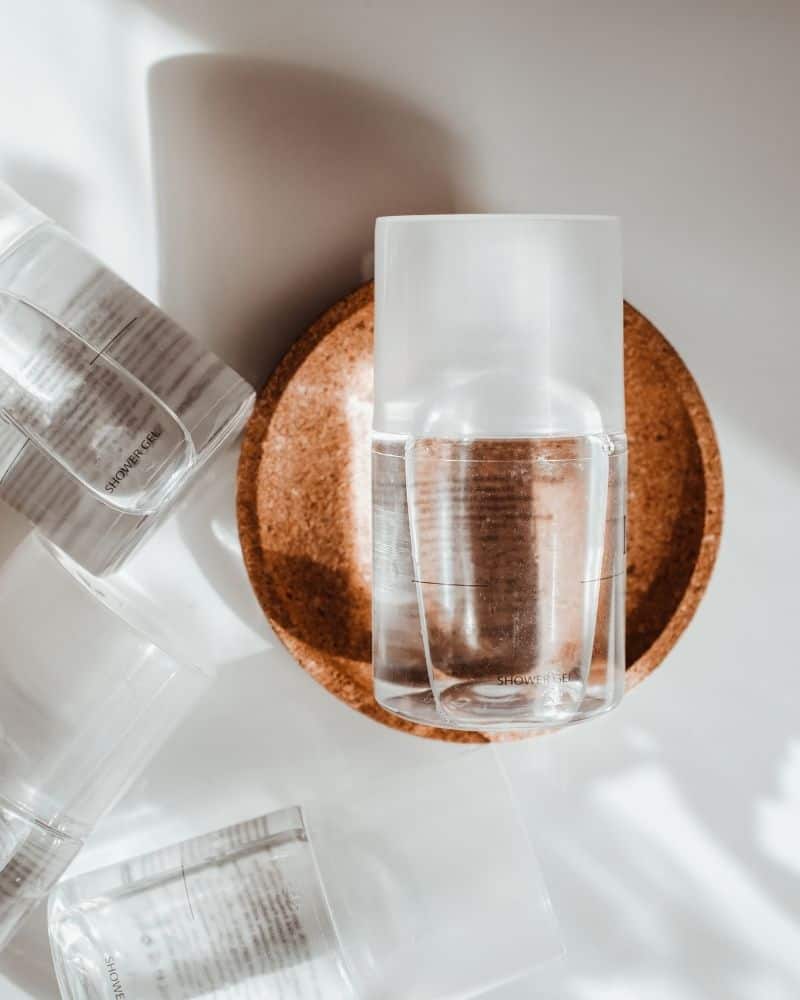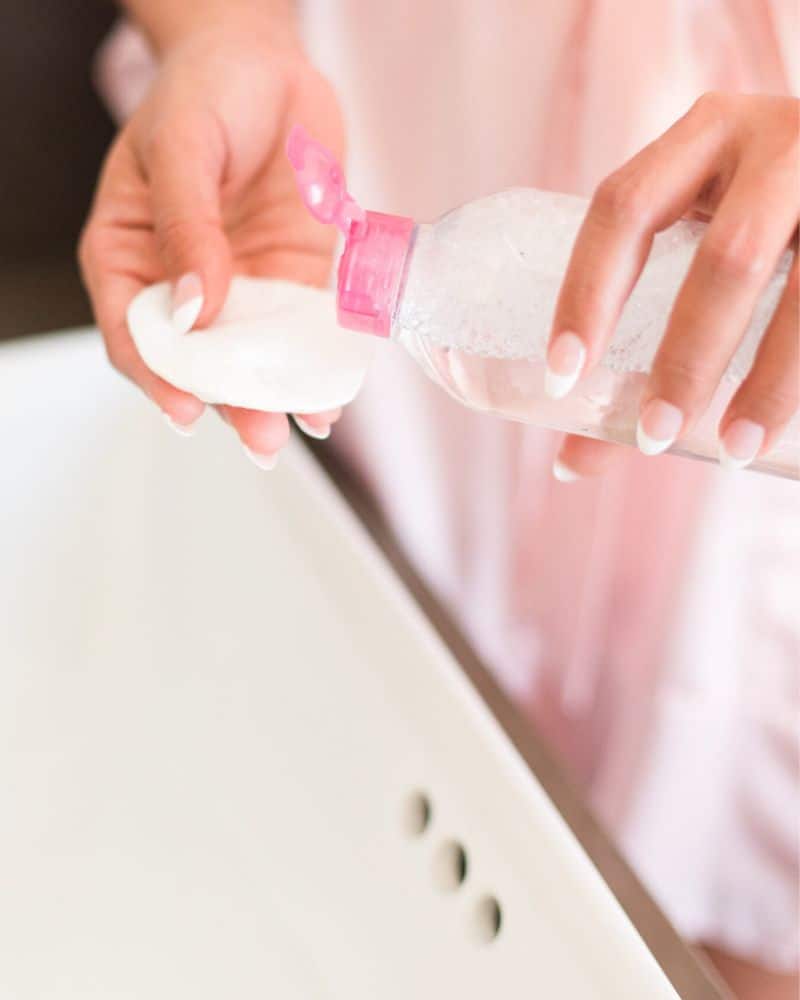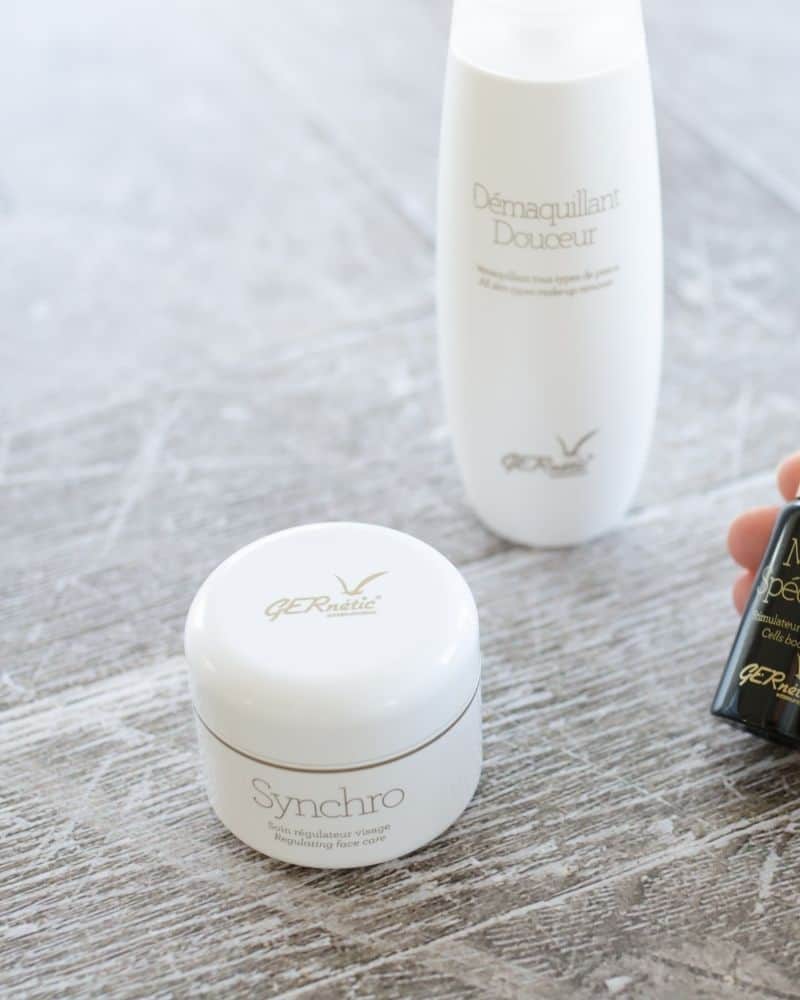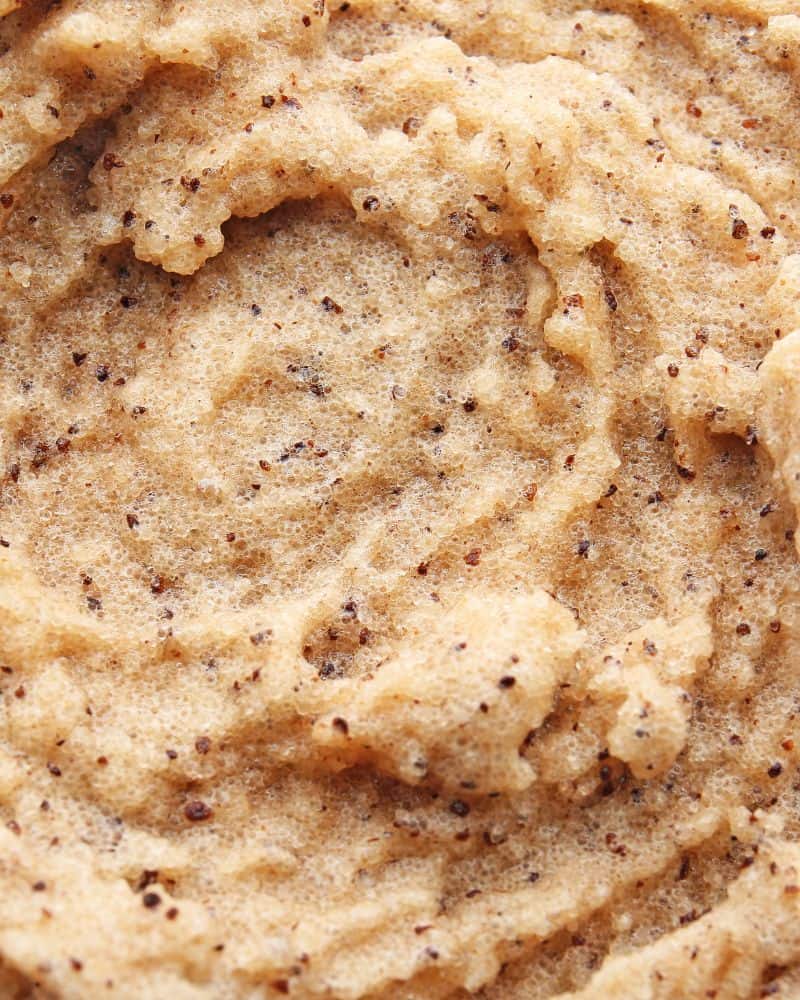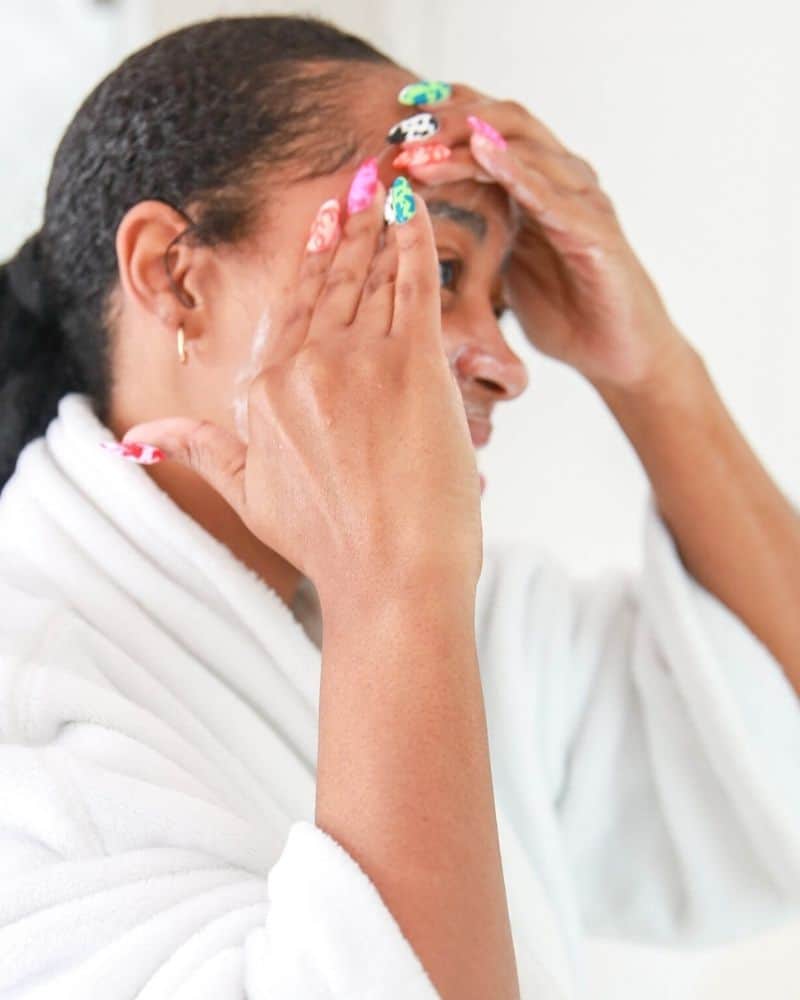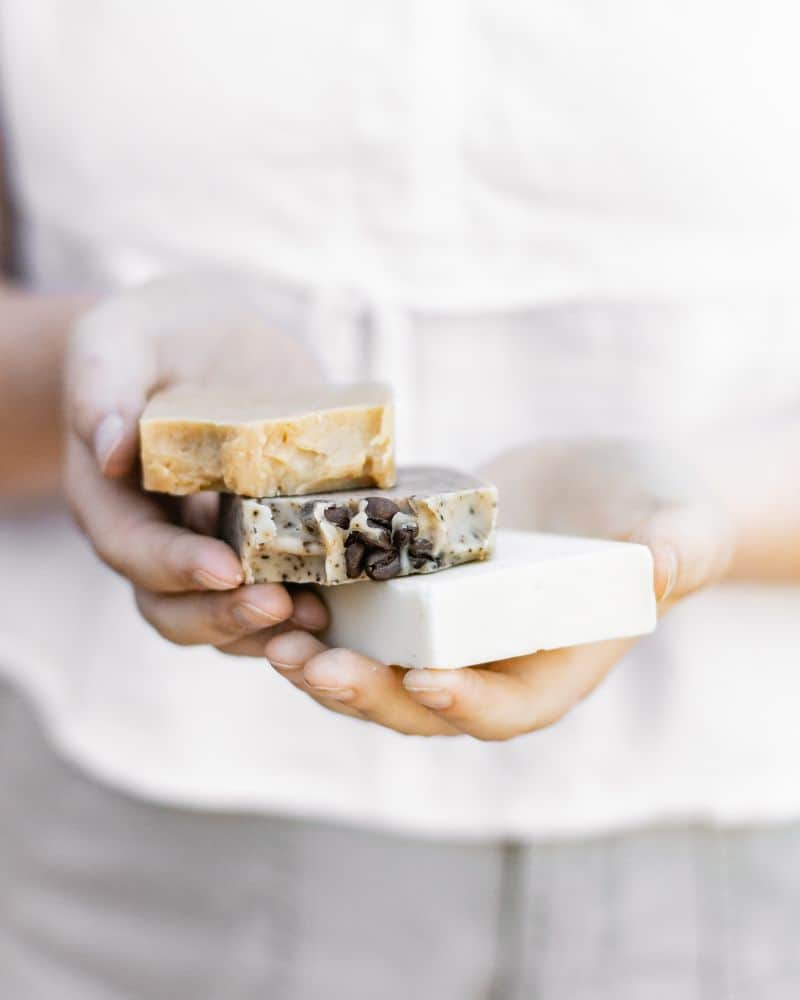Why Does Moisturizer Burn? 7 Possible Reasons
This post may contain affiliate links.
Moisturizers are an essential part of any skincare routine – they help to strengthen the skin barrier, restore hydration and moisture and prevent dehydration. If they’re so good for the skin, then why do so many people experience burning or stinging after applying moisturizer? If you’re one of the many people who experience this uncomfortable sensation, don’t worry – you’re not alone! As someone with very sensitive skin and prone to perioral dermatitis, I know a thing or two about irritation and burning when it comes to my skincare. So keep on reading for the answers to why does my moisturizer burn and what to do if you experience burning or stinging from your moisturizer.
What Causes Moisturizer To Burn?
While there can be many different reasons for this, it all comes down to two main causes: you have a damaged moisture barrier or you’re using the wrong moisturizer for your skin type. Luckily, there are some quick fixes to get your skin back on track such as analyzing the ingredients in your moisturizer to make sure they are suitable for your skin type and repairing the skin barrier.
- Your skin barrier is damaged
- Your skin is irritated and dry
- You have sensitive skin
- You’re allergic to the product ingredient(s)
- You’re overexfoliating
- You’re using potentially irritating/drying ingredients
So if you’re experiencing burning or stinging when you’re applying your moisturizer, the first step is to figure out which one of these causes is the culprit, and there could be several different culprits! Below, we’ll go into more detail about these 7 causes and talk about solutions.

Is Moisturizer Supposed To Burn?
Does lotion burning mean it’s working? It’s a common myth that any kind of burning or tingling sensation means that the product is working.
No, your moisturizer should never burn, even if it has exfoliating ingredients. It’s a common myth that if it tingles or burns, that means the product is working, but that’s actually not true and you could be damaging your skin. If your moisturizer is burning, your skin is trying to tell you something is wrong.
Related post: Is Toner Supposed To Burn?
The Skin Barrier & Burning Sensations
Now if you want to get into all of the details and science behind why certain skincare products and ingredients burn your skin, this section is for you – I’ll explain everything you need to know about the skin barrier and the reasons why products might sting your skin if your skin barrier is damaged or compromised.
The skin barrier is the outermost layer of the skin and is also known as the epidermis or stratum corneum. The skin’s barrier is an integral part of healthy skin and a healthy body. When it’s healthy, the skin barrier prevents water loss, which keeps your skin hydrated. It also prevents irritants or allergens from penetrating the skin and causing irritation or reactions.
The skin barrier is the outermost layer of the skin and is made up of proteins, lipids and dead cells. When the skin barrier is intact, it slows the loss of water down and prevents allergens from penetrating through the protective top layer of the skin, which is consequently translated into a healthy looking skin. However, when the skin barrier is impaired, chemicals, irritants, viruses, bacteria and allergens can enter the skin and trigger an irritation and inflammation, which leads to a burning sensation among other symptoms.
The skin barrier is made up of a special type of cell called corneocytes, which are bound together by fatty acids, cholesterol, proteins and ceramides. These bonds are usually very tight, which is how they prevent chemicals or allergens from penetrating the skin.
When the skin barrier becomes damaged, these bonds are loosened and it’s easier for irritants, chemicals, allergens, etc to penetrate the skin, which can lead to irritation, burning, redness, etc.
Why Does My Skin Burn When I Apply Moisturizer?
Above, we touched on the 7 main reasons why moisturizer burns your skin, now we’ll deep dive into each of those and learn what to do if moisturizer burns your skin.
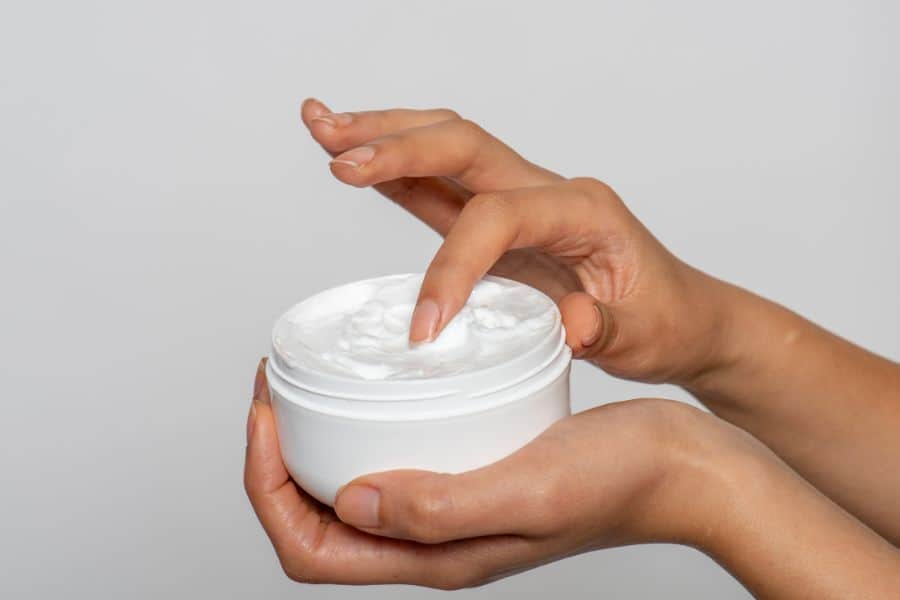
Related post: Why Does CeraVe Moisturizer Burn My Skin?
Your Skin Barrier Is Compromised
The first reason why your moisturizer might be burning is that your skin barrier is compromised. Your skin barrier is the outermost layer of your skin and its main job is to protect your skin from environmental aggressors like pollution, UV rays, and bacteria.
When your skin barrier is damaged, it can no longer do its job properly and this can lead to all sorts of skin problems like dryness, redness, and sensitivity.
One of the biggest symptoms of a compromised skin barrier is a burning sensation when you apply skincare products. If you’re wondering why does my face burn when I put on moisturizer, a compromised skin barrier is the most likely culprit.
If every product burns your skin, then this is a good indicator that your skin barrier is damaged.
What To Do About It
First, you’ll want to stop using any product that burns your skin. That might mean you have to do what’s called ‘zero therapy’ which means you use absolutely nothing on your skin for a few days.
If you apply anything that burns your skin, immediately wash it off.
Second, you’ll want to use very basic products. Think CeraVe, La Roche Posay, Bioderma or Avene. No frills, just a gentle, sulfate-free cleanser and moisturizer for a few weeks. You can slowly start to add in barrier strengthening ingredients like hyaluronic acid, glycerin, ceramides, fatty acids, cholesterol and panthenol.
Your Skin Is Irritated Or Dry
Every wondered why does dry skin burn when you put lotion on it?
Dry skin itself can cause irritation, burning and stinging, and when dry skin is bad enough, this can cause your skincare products, like your moisturizer, to burn and sting.
Dry skin is also more sensitive to drying or harsh ingredients such as fragrance, essential oils, alcohols and chemical exfoliants. So if you have dry skin, be sure to check your moisturizer for any irritating ingredients.
What To Do About It
Luckily, the fix for dry skin is pretty easy. Dry skin means your skin is lacking oil, so you’ll want to replenish the oil in your skin with rich moisturizers that contain butters and oils, along with other ingredients such as urea or glycerin. Facial oils can also be extremely helpful for dry skin, along with ointment such as aquaphor or cerave healing ointment.
You Have Sensitive Skin
If your face stings when applying moisturizer or other products, another reason could be sensitive or reactive skin.
If you have sensitive skin, you’re more likely to experience a burning sensation when applying moisturizer (or any other skincare product for that matter). This is because your skin is already inflamed and any type of product (even the most gentle ones) can irritate your skin and cause a burning sensation.
Sensitive skin is more likely to experience a reaction like burning or stinging from skincare products. This can happen with a particular product or even a particular ingredient.
If you have sensitive skin, it’s extremely important to pick a moisturizer that’s formulated for sensitive skin. This way you can avoid harsh ingredients and potential irritants in your products and prevent your moisturizer burning in the first place.
Additionally, certain skin conditions like rosacea or eczema can make skin more sensitive and more susceptible to reactions like burning or stinging.
What To Do About It
Sensitive skin usually requires a little extra TLC and you have to be more careful with your skincare products. If you have sensitive skin and your moisturizer seems to be burning, check the ingredients list for any kind of irritating ingredients like fragrance, essential oils or chemical exfoliants that might be irritating your sensitive skin.
If you don’t see any in your moisturizer, check your other products. Chances are something is causing your skin to be overly reactive.
You Are Having A Reaction To The Product Or Ingredient
Another reason your moisturizer might be burning is that you’re having a reaction to a product or ingredient. This is most likely to happen if you have sensitive skin, but it’s possible for anyone to have a reaction to a particular product or ingredient.
A reaction can be an allergic reaction or just a reaction to the product or ingredient that just didn’t agree with your skin.
If you think you’re having a reaction to a product, it’s important to stop using the product immediately.
What To Do About It
If you think you’re having a reaction to a product, it’s important to stop using the product immediately and it’s best to thoroughly wash your skin with lukewarm water and gently pat dry. Figuring out what ingredient you’re allergic to can be difficult, so you’ll likely need to get allergy tested or do some testing to figure out what ingredients might be causing the reaction.
You Are Using Bad Ingredients
If your face stings after applying moisturizer, you may want to take a look at the ingredients in the product you are using.
There are a lot of skincare products on the market that contain harsh chemicals and artificial fragrances. These ingredients can irritate your skin and cause a burning sensation when you apply the product, even if you don’t have sensitive skin.
If you want to avoid this, it’s important to pick a well-formulated moisturizer with no harsh ingredients.
Common ingredients to avoid are:
- Alcohols
- Fragrance
- Essential oils
Certain ingredients like preservatives or parabens can also cause a burning sensation. Although preservatives are necessary to keep bacteria from growing in your product, they can cause issues for certain people.
What To Do About It
Luckily, if your moisturizer is burning your skin because it contains irritating ingredients, the fix is pretty easy! Simply stop using it and switch to something more gentle and nourishing.
You Have Overexfoliated Your Skin
If you’re wondering why does my skin burn when I put moisturizer on, a common culprit is overexfoliation.
If you’ve been exfoliating your skin a lot lately (either with physical exfoliants or chemical exfoliants), it’s possible that you’ve overexfoliated your skin. This means you’ve removed too many dead skin cells from the surface of your skin and this can lead to all sorts of problems like dryness, redness, a damaged skin barrier and more.
One of the symptoms of overexfoliation is a burning sensation when you apply skincare products. If you think you’ve overexfoliated your skin, it’s important to take a break from exfoliating and give your skin time to recover.
What To Do About It
Overexfoliated skin can be tricky to treat, but the first step is to stop using any kind of exfoliants like glycolic acid, retinol, salicylic acid, physical scrubs etc. You’ll likely need to stop using these for several weeks. During this time, you should focus on using very gentle products with repairing ingredients like ceramides, fatty acids, hyaluronic acid and cholesterol.
You Are Using Irritating Ingredients
Certain ingredients can cause your skin to burn after applying moisturizer. Although they are not bad ingredients by any means, they can still irritate skin, especially if your skin is sensitive, dry or you have a damaged skin barrier.
Here are a few ingredients that can cause a stinging or burning sensation after applying skincare products.
- Alpha (AHA) & Beta (BHA) Hydroxy Acid
- Surfactant and Emulsifiers
- Preservatives
What To Do About It
Irritating ingredients can be a common cause of moisturizers burning your skin. If this is the case, simply stop using the product and switch to something more gentle. Avene, La Roche Posay and Bioderma are all great brands with nourishing, yet gentle moisturizers for all skin types.
What To Do If Your Moisturizer Burns Your Skin
If you’ve been using the same moisturizer for a while and find it suddenly starts to burn when you apply it, there are several reasons that could be causing the burning or stinging sensation. And if you ever experience it, the first thing you wonder how do I stop my face from burning after moisturizer? Here’s what to do when your moisturizer burns your skin and how to soothe irritated and angry skin.

Stop Using The Product
If your moisturizer is burning your skin, the first thing you should do is stop using it immediately. This is especially important if you think you’re having a reaction to a product or ingredient.
It’s important to wash off the product as soon as you experience any burning sensation. Washing the product off quickly will avoid further irritation and damage. Be sure to use a gentle cleanser, lukewarm water and gently pat skin dry.
Soothe Skin
The next step is to use soothing ingredients, but keep your products minimal. Meaning, don’t go using 10 different serums and 3 moisturizers.
When skin is sensitive or irritated, less is more.
The goal is to soothe and calm the skin, not irritate it further.
Some soothing ingredients you can try are:
- aloe
- honey
- colloidal oatmeal
- centella asiatica
- snail
Avoid Harsh Ingredients
As we mentioned before, one of the reasons your moisturizer might be burning is because it contains harsh ingredients. If this is the case, you should avoid any products with these kinds of ingredients:
- alcohol
- fragrance
- essential oils
Instead, look for products that are specifically formulated for sensitive skin and free from potential irritants.
Give Your Skin A Break
If you regularly use chemical or physical exfoliants, it’s a good idea to skip those products for the time being while you work on healing your skin. This is especially important if you have a damaged skin barrier or have over-exfoliated your skin.
Continuing to use exfoliants can only cause more damage. When you skin barrier is damaged enough, it may be months or even years before you can safely introduce exfoliants into your routine again.
Try skipping the exfoliation for a few nights and see how your skin reacts. You may need to take a longer break, depending on how irritated or damaged your skin is.
Why Does Moisturizer Burn After Shaving?
Applying moisturizer right after shaving can often cause a burning or stinging sensation, which is most likely caused by shaving. As you shave, the razor blade exfoliates the top layer of skin, which removes all those dead skin cells and leaves behind new, fresh skin cells. Shaving can also cause friction and irritation, especially if you don’t use a good shaving cream. These things combined can lead to burning when applying moisturizer after shaving.
To combat this, be sure to use a really good shaving cream that allows the razor to glide over the skin. It’s also a good idea to invest in a good moisturizing razor with at least 3 blades.
Why Does Every Moisturizer Burn My Face?
If you’ve tried multiple different moisturizer or creams and find they’re still causing a burning or stinging sensation, it’s possible you may have an underlying skin conditioner or allergy that is causing the sensitivity
Some common skin conditions that can cause sensitivity to moisturizers include eczema, rosacea, and psoriasis. Additionally, certain ingredients in moisturizers, such as fragrance, preservatives, or dyes, can cause irritation or an allergic reaction.
Here are some potential reasons why every moisturizer may be causing a burning sensation on your face:
- Allergic reactions: You may be allergic to one or more ingredients commonly found in moisturizers, such as fragrances, preservatives, or certain plant extracts.
- Sensitive skin: Your skin may be more sensitive to certain ingredients in moisturizers, even if you are not allergic to them.
- Skin conditions: You may have an underlying skin condition, such as eczema, psoriasis, or rosacea, which can make your skin more prone to irritation.
- Incompatible products: You may be using other skincare products that are incompatible with the moisturizer you are using, which can cause irritation or a reaction. This is especially true if you are using multiple actives in your routine. For example, a vitamin c serum with a niacinamide moisturizer are not compatible and will likely cause a niacin flush, irritation and burning.
Why Is My Moisturizer Burning My Face All of a Sudden?
If you’ve been using the same moisturizer for a while and find that it’s suddenly burning or stinging your skin, you likely have a damaged skin barrier. When the moisture barrier is damaged, skin is more sensitive to ingredients in your products.
If this happens, you’ll want to focus on strengthening the skin barrier by using a gentle, non-foaming cleanser and a good moisturizer. You may even need to use something like argan oil or Aquaphor for a while while your skin heals, and then slowly reintroduce a moisturizer or lotion back into your routine.
To strengthen your skin barrier, look for ingredients like hyaluronic acid, glycerin, ceramides, fatty acids and cholesterol, which are all building blocks for a healthy skin barrier.
Should I Stop Using Moisturizer If It Burns?
In short, yes, if your moisturizer is burning your skin, you should stop using it immediately. Moisturizer should not burn your skin, and if it does, it’s a sign that it just does not work for your skin or that something is wrong.
As soon as you feel any kind of burning, tingling or stinging, it’s best to wash off the moisturizer as soon as possible to reduce irritation and damage.
How To Tell If Your Skin Is Irritated From Your Moisturizer
If you suspect that your skin is irritated from your moisturizer, there are a few signs to look out for:
- Redness: If your skin appears redder than usual, it may be a sign of irritation, especially if your skin turns red immediately or soon after applying your moisturizer
- Itching or burning: If you experience itching, burning, or stinging sensations after applying your moisturizer, it could be a sign of irritation and that your skin does not like that particular product.
- Dryness or flakiness: If your skin feels drier or more flaky than usual after applying your moisturizer, it may be a sign that the product is not working for your skin. Irritation can also cause rough texture and uneven skin.
- Breakouts: If you notice more pimples or blemishes than usual after using your moisturizer, it could be a sign of irritation or a reaction to one or more of the ingredients in the product. This is especially true if you experience congestion in large patches or all over the skin.
If you experience any of these symptoms, you may want to consider stopping use of the moisturizer and looking for a different product that is better suited for your skin type.
How Should Skin Feel After Moisturizing?
After you’ve applied your moisturizer and given it a few minutes to sink in, your skin should feel hydrated and comfortable but not greasy, heavy, tight or dry. If your skin doesn’t feel comfortable after moisturizing, it means you are using the wrong moisturizer.
For example, if you have oily skin and your moisturizer leaves your skin looking shiny and it feels heavy, it’s not the right product. And if you have dry skin and your skin is left feeling tight, itchy and uncomfortable, it’s not the right product.
What To Use If Your Facial Moisturizer Burns Your Skin
If you experience any kind of stinging or burning after using your moisturizer, you’re probably wondering what the heck to do. Here are some quick tips on what to do if your moisturizer stings your skin.
- Use a moisturizer formulated for sensitive skin: Look for products that are labeled for sensitive skin. These are formulated without irritating ingredients and often have very basic ingredients which are usually well tolerated to avoid any further irritation.
- Avoid fragrances: Fragrances are a common cause of skin irritation, so stop using any sort of product with fragrances, including cleansers, toners, moisturizers, etc.
- Use soothing ingredients: Look for ingredients like aloe, oatmeal, allantoin, centella or green tea to reduce stinging, burning and redness.
- Stick to a basic routine: Now is not the time to use a 10 step skincare routine. Stick with a gentle cleanser, moisturizer and sunscreen while your skin heals and introduce your normal products back into your routine one at a time.
- Zero therapy: Zero therapy is commonly recommended for certain inflammatory skin conditions like perioral dermatitis and involves avoiding all skincare and cosmetic products while your skin heals. This is best for those who are having a severe reaction or experiencing burning or stinging with every skincare product.
Why Does My Face Burn When I Put On Moisturizer FAQ’s
Why does my face burn when i put anything on it?
If your cleanser, toner, serum, treatments and moisturizers are all burning your skin, you’re probably left wondering why is my face burning after skin care all of a sudden?
When your skin burns after moisturizer, that’s one thing, but if everything is burning your face all of a sudden, that’s a warning sign that your skin barrier is likely damaged.
It’s not normal to experience any kind of burning, stinging or tingling sensation when you use skincare products. When this happens, it means that something is wrong. If your skin burns no matter what you put on it, it most likely means that your skin barrier is damaged. This happens due to over-exfoliation, using harsh products with irritating/drying ingredients and not moisturizing enough.
To fix this, you’ll need to stop using any kind of exfoliants and stick with a sulfate-free, gentle cleanser and a basic moisturizer. No frills here! Using a healing ointment like Aquaphor or CeraVe can also help to strengthen the skin barrier.
Why does lotion burn my dry hands?
We’ve all likely experienced applying hand lotion and experiencing an unpleasant stinging or burning sensation. It might leave you wondering why do my hands burn when I put lotion on and what can I do to fix it?
Dry hands can be both irritating and painful. They often turn rough and chapped from moisture loss and a damaged skin barrier. Lotions and creams are usually thought of as a solution, but some lotions can actually burn dry hands instead of soothing them. Dry skin is much more sensitive to potential irritants, including common ingredients found in many lotions like alcohols and fragrances, which can cause an unpleasant burning sensation when applied.
If your hands burn after lotion, check the ingredients to make sure the lotion doesn’t contain irritating or drying ingredients.
Additionally, if your skin is cracked or chapped, anything you put on your skin can leading to a burning sensation. Even water can cause more irritation. To combat this, use a hand cream that has lots of oils, butters and waxes that’s free of any fragrances, essential oils and alcohols.
You may even want to use an ointment such as Aquaphor or CeraVe Healing Ointment for a few days to protect the skin and prevent further irritation.
When my hands sting after lotion, I like to use a hydrating and soothing serum with ingredients like hyaluronic acid, panthenol, snail and oatmeal. Then I follow up with a rich hand cream with oils, butters, ceramides and fatty acids.
If my hands are extremely dry, I will apply a healing ointment like Aquaphor and put on gloves while I sleep. This routine really helps to heal the skin on my hands and prevent my hands from burning when applying lotion, creams or even soap and water.
Why does moisturizer burn after retinol?
Moisturizer can sometimes burn after using retinol because retinol is a powerful ingredient that can cause skin sensitivity and irritation, especially if you’re new to using it. Retinol works by increasing cell turnover and stimulating collagen production, which can lead to smoother, more radiant skin over time. However, it can also cause dryness, redness, and flaking, especially if used too frequently or in high concentrations.
When you apply a moisturizer after using retinol, it can cause a burning or stinging sensation because the skin is already sensitive and the moisturizer may contain ingredients that further exacerbate the irritation, especially if the moisturizer has irritating ingredients like fragrance or essential oils.
To avoid this, it’s important to use a gentle, fragrance-free moisturizer that is specifically formulated for sensitive skin. You should also wait at least 20-30 minutes after applying retinol before applying moisturizer, as this will give your skin time to absorb the retinol and reduce the risk of irritation.
Why do my eyelids burn when I apply moisturizer?
The skin around your eyes and on your eyelids is incredibly delicate and sensitive. The skin is much thinner than that on the rest of your face. This means that your eye area is much more susceptible to burning or stinging when applying moisturizer or eye cream. If you experience burning when applying moisturizer around your eyes or on your eyelid, it’s likely because the ingredients in the moisturizer are causing irritation. To combat this, avoid using creams that have fragrance, alcohol, essential oils and chemical exfoliants around your eye area.
Is it normal for your face to burn after applying moisturizer?
No, it is not normal for your face to burn after applying moisturizer. If this happens, it could be due to an allergic reaction to one of the ingredients in the moisturizer or a damaged skin barrier.
Why does my moistuzier burn after benzoyl peroxide?
Benzoyl peroxide is a commonly used acne treatment that can be very effective at clearing up breakouts. However, it can also be very drying and irritating to the skin, especially if used in high concentrations or for extended periods of time.
When you apply a moisturizer after benzoyl peroxide, it can cause a burning or stinging sensation because the skin is already sensitive and the moisturizer may contain ingredients that further exacerbate the irritation.
To avoid this, it’s important to use a gentle, fragrance-free moisturizer that is specifically formulated for sensitive skin. Look for products that contain ingredients like ceramides, hyaluronic acid, and glycerin, which help to hydrate and soothe the skin without causing further irritation and avoid using a cream with alcohol, fragrance or essential oils.
You can also try using benzoyl peroxide less frequently or using a lower concentration of the product. For example, if you’re currently using a 10% benzoyl peroxide product, you may want to switch to a 5% or 2.5% concentration to reduce the risk of irritation.
Why does moisturizer burn the skin on my body?
If your lotion burns dry skin on your body, the same factors apply: allergic reaction, a compromised skin barrier, irritating ingredients or overexfoliation. To help soothe skin and strengthen your skin barrier, the same rules apply to your body and facial skin.
To soothe skin, you should use calming ingredients such as aloe vera, honey and oatmeal. These ingredients have anti-inflammatory properties that can reduce redness and irritation.
You should also avoid hot water when showering or bathing. Hot water can strip away the natural oils and hydration from your skin, making it more prone to dryness, breakouts, and other forms of irritation.
Sulfate-free body washes can also help to prevent irritation and dryness. It’s also best to apply moisturizer right after showering to help lock in moisture. Hydrating body washes with natural oils, like almond oil and jojoba, can also help protect the skin barrier f. Additionally, using a gentle exfoliant a few times a week to slough off dead skin cells is also beneficial for softer and smoother skin.
Why does my face feel hot after skincare?
There could be several reasons why your face feels hot after skincare. Here are some possible explanations that can help you determine what the cause is:
Active ingredients:
Active ingredients like glycolic acid or niacinamide can often cause your skin to feel hot or irritated after applying. This usually means that the products are too irritating for your skin and you should stop using them immediately. If your face feels hot or warm, it’s best to wash your face with a gentle cleanser to avoid any further irritation. This type of reaction can happen with any type of active ingredient such as vitamin c, retinol, aha, bha, niacinamide, etc.
Ingredient reaction:
Some ingredients just don’t play well together. A common one is niacinaimde with vitamin c or niacinamide with bha. Both vitamin c and bha lower the pH of the niacinamide, which causes what’s called a niacin flush. Which means your face will turn red and will feel hot until the reaction subsides.
Allergic reaction:
It’s possible that you may be allergic to one or more ingredients in your skincare product, which can cause your skin to become red, itchy, and hot to the touch. If you suspect an allergic reaction, stop using the product immediately and consult with a dermatologist.
Irritation:
Some skincare products can be too harsh for certain skin types, especially if they contain exfoliating agents or other active ingredients. If your skin feels hot, itchy, or irritated after using a product, it’s a sign that it may be too harsh for you.
If you’re experiencing discomfort or other unusual symptoms after using skincare products, it’s always a good idea to speak with a dermatologist or other healthcare professional. They can help you identify the underlying cause of your symptoms and recommend an appropriate course of treatment.
Why Does Moisturizer Burn Wrap Up
When you moisturize your skin, it should not burn. If it does, it means that the product is either not compatible with your skin or contains harsh ingredients that are damaging your skin. In either case, stop using the product immediately and get your skin back on track. It can be a frustrating experience when your moisturizer burns your skin all of a sudden, but it’s important to stop using it to avoid damaging your skin barrier. Additionally, it’s equally as important to find a good moisturizer that doesn’t burn and leaves your skin feeling comfortable.
If you’re looking for a good moisturizer to use, I love the Cerave Moisturizing Lotion or Cream. They’re both great for sensitive skin and work to repair the skin barrier.
